|
POWER! The word "power," in and of itself, evokes so many different overtones, implications, and associations. When we are powerful, we are said to be full of power. When we are powerless, we have less power than we actually need. When there is a power shift, strength moves from one powerful side to the other less-powerful side. And when power is wielded correctly, amazing and wonderful things can occur. In fact, when the tiniest amount of power is employed appropriately, the resulting righteously repercussive ripples reach a resounding roar… loud enough to brighten the darkest of nights. The word power is mentioned over 70 times in my book, The Ideal: Your Guide to An Ideal Life. And as we wrap up the last entry on this e-course titled “40 Days and Two Little Words,” I believe it is appropriate to quote a section from the book. Specifically: "Education is the only asset that no one can take from you. Learn all you can; but be absolutely sure to use your knowledge, or you will risk losing it. Remember: knowledge is not power until it is applied. The definition of wisdom is 'applied knowledge.' Thus, when you use your knowledge, you instantly become wise." The above-referenced section is worth pointing out here because I intend to challenge you with the great asset that you now have at your command. You now have the education and knowledge of the previously posted 39 e-notes. And, as I discussed in the e-note from Day 31 (Forgive Everyone), coherent people never really forget anything. We remember everything we have ever learned; but we are often challenged when trying to recall the knowledge. Newsflash: If you don’t use the knowledge you currently have, you will soon lose access to that that knowledge; you will soon be challenged when trying to recall that knowledge. Indeed, when I say “you will soon lose that knowledge,” I am referring to the loss of the ability to recall specific knowledge. For example… Quickly answer this question: “What’s your telephone number?” You do know your telephone number. However, because you don’t often call yourself, it’s not immediately at the forefront of your mind. Heck… try to think of almost anybody’s cellphone number nowadays, and it’s a chore! Why? …because it’s no longer a necessity that we hold and retrieve the telephone numbers in our head. We simply save them in our cell phones. Likewise, if you don’t regularly use the information in the previous e-notes (and this one), the knowledge in those e-notes will slowly recede to the back of your mind, behind all of those telephone numbers you used to know. So, what’s my point? If you have read some, many, or all of the previous Two Little Word combinations over the last 40 Days, you are now armed with some pretty good directions on how to change everyday situations in a manner that will directly benefit you. If and when you follow these directions, you are guaranteed to have a better, happier, more fulfilled life. How and why can I make such a bold statement about you, your days ahead, and your life? Well, first of all, you are a very powerful and knowledgeable person… especially when it comes to YOU. No one else knows you as well as you do. And, more importantly, no one else has any real power over you. Secondly, we already know that you are magnificent and miraculously unique. And, thirdly, to be sure, there is absolutely an ideal place for you and your dreams in this world. But first you must understand and accept the massive amounts of real power that you have… as well as the absolute absence of power that others have over you. Once you understand these two all-important facts, you can better understand the power of choice. The power to choose our actions is painfully undervalued, underestimated, and underutilized. In reality, you choose every single one of your actions. For example, no one is forcing you to read these words. You are choosing to read these words. Other people may influence you. Family members may influence your behavior. Friends might influenceyour decisions. Other decisions and outcomes may influence, limit, or expand your choices and associated decisions. However… You are the main supervisor of you. You are the ultimate director of you. You are the powerful president of you. You are the earthly god of you. And, yes… you are in control of you. And, as director, president, and god of your S.E.L.F., you have the ultimate power over you. People may influence you. But no one can make you do anything. No one controls you. You control you. But as soon as you think (or believe) that other people have power over you, that thought (or belief) becomes reality… and those other people instantly have power over you. As I leave you with this final post, I sincerely hope I have added value to you, your sense of self, and how you interact with yourself and the world. I sincerely believe in the power of the human spirit, especially when we slow down, get clear on our path forward, set goals, do things on purpose, proceed with thanks but without fear, and live a life with faith (and MORE faith, when necessary). After reading through these 40 Two Little Word combinations, I want you to… BE EMPOWERED. In reality, the best way to predict the future is to create it. And you definitely have the power to purposefully create. But remember: to bake a cake, you have to break a few eggs. Indeed… To create, you must first demolish a few things. But that’s ok. Henceforth and forever more, choose to be a creator. You are the creator of your day. You are the creator. You are… You. Aloha and mahalo for reading this. Continued blessings to you and yours. Aloha, John Forgive. Focus. Find. Accept. Adapt. Achieve. ® John H. Clark III is an optimistic realist.
Principal consultant at The PIE Group, and Executive Director of TeenBuilding USA, [a non-profit 501c(3)], John believes better development of leaders is what we (all) need. And to be better organizations, we need more good leaders, not followers. To build better leaders, we must start with the individual (you, she, he, and me). Described as “an innovative leader,” John teaches leaders, organizations, and individuals how to inspire each other. With a bold goal to inspire a worldwide community of optimistic realists who continuously accept, adapt to, and achieve the bold and beautiful concept of The Ideal Life, John is leading a movement to inspire people to apply his trademarked mantra {Accept. Adapt. Achieve! ®}. An innovative business manager and retired naval officer, John is fascinated by leaders and organizations that make the greatest impact within their organizational culture and within the “real” world — people who “get it.” Over the course of his life as a military leader, corporate mentor, and innovative content creator, John has discovered a wealth of insight about how we think, act and communicate within our respective work/life environments. As a career naval officer, mentor, educator, and optimistic realist, he has devoted his life to sharing insights to assist in our quests to become better at what we all do – live @ work! An optimist with a penchant for writing about realistic solutions to the challenges of everyday life, John is the author of 3 books: a leadership-development insider, The Ideal: Your guide to An Ideal Life, a teen-focused guide, Getting Out: Expert Advice for Today’s Teens, and the Christian-based book, God’s Heartbeat: A Powerful Premise for Leading a Christian Life. He delivers a unique and refreshing point of view to life's seemingly overwhelming situations. Through books, blogs, and everyday conversation, John's message resonates with an empowering blend of ideals that enrich, uplift, and “authorize” people to set and achieve goals far beyond current mindsets. His trademarked phrase is a winner: The penultimate post ~ Our world is filled with a wealth of experience. Some of those experiences occurred last week and last year. Some of those experiences occurred hundreds of years ago. Sir Isaac Newton published notes on many of his brilliant and world-changing experiences, as did Plato, Socrates, Niccolò Machiavelli, Epicurus, and two of my personal favorites, Marcus Aurelius and Jesus of Nazareth. Each of these great philosophers left a profound mark on the world by publicly stating and sharing their respective philosophies. Yet their published works often go unseen, unread, unappreciated, and unused by most people. Despite having a prolific and terrific sense of seemingly supernatural wisdom, these philosophers and many of their teachings will go unnoticed by the vast majority of people. Why? Time and time again, I hear pessimistic people say, “There is no instruction book for life.” Yet, these same people do not seek the instructions of some of the wisest people who ever walked the earth. In reality, the aforementioned philosophers were more than just wise men; they were mighty mental mentors; immensely informed intellectuals; and tremendously talented teachers; and, from my point of view, One of them not only gave us His solution to all of our problems, but He is also THEE Solution to all of our problems. Indeed, the respective philosophies of the aforementioned philosophers changed the world. But what is it about the word “philosophy” and its implied academic doctrine that turns so many of us away from proven, prudent instruction that can positively affect our lives? The answer is usually rooted in fear. As is the case with calculus, cooking, and constant change, many people fear what they don’t understand. Instead of investing a little time to seek and understand philosophy, many people prefer to waste valuable time denouncing the one thing that can change their lives: tested and tried philosophies. And to be sure, we must be very careful when choosing, tasting, and nurturing ourselves on another person’s philosophy. This could be risky. However, to change is to move from one state of existence to another, ultimately arriving at a different state of being. And to move from your current intellectual spot to a whole new mental location, you must be exposed to new methods and manners of thinking, doing, and being. These methods might be as old as Methuselah. Yet, they might be new to you. Make no mistake: We all have our own philosophy. Some of your philosophy was handed down by your parents, ancestors, and extended family members. Portions of your personal philosophy were developed when you learned from your previous mistakes. And still, other parts of your philosophy were created by things you read in books, saw with your eyes, and felt with your heart. Indeed, with vast differences in our respective experiences, we all have a different philosophy. But what exactly is “philosophy”? And how can it help us? The word “philosophy” comes from the Greek φιλοσοφία (philosophia), which literally means “love of wisdom.” But what is wisdom? Wisdom is the application (or use) of knowledge. But what is knowledge? Knowledge is simply retained information; this includes facts, figures, and everything in this series of “40 Days and Two Little Words.” To achieve an elevated state of being, we must learn to learn from others and ourselves. I will re-state the previous sentence for clarity: To achieve an elevated state of being, we must learn to learn from others and ourselves. More importantly, we must do more than merely learn. Yes, we must love the learning. But most importantly, we must love learning how to apply what we have learned. Our purpose is to: Move from (merely) gaining and retaining information… …to using and applying the information/knowledge that we gained… …to loving the wisdom we have acquired by using the knowledge. Re-stating the words above into fewer words below: Our purpose is to move from simply learning; and then… Move to being wise; and then… Move (again) to using a whole new philosophy. In the final analysis, loving wisdom is simply loving what is. This is not to say that we have to love all of the horrible things that have happened or will happen at any time in our lengthy lives (or in the lives of our closest friends, nearest neighbors, and evil enemies). Regardless of whether or not we like or agree with what “is…” sooner or later, we will have to accept it. By crossing the threshold from denial to acceptance, we can begin to adapt to almost any event. To adapt is “to change.” To successfully adapt, we must first accept and understand that change is inevitable. And when something is inevitable, it is literally unstoppable. And when something is unstoppable, it is also predictable. Change will, indeed, occur. If, then, you cannot successfully work to stop change, you must learn how to successfully make change work for you. Moreover, the likelihood of creating a successful change event increases exponentially when you focus on changing your S.E.L.F. What’s one of the best ways to do this? LOVE WISDOM. How can one best do this? Discover your own philosophy. And, if you have to, focus on finding and following a philosopher. Don’t blindly follow, swallow, or hollow out your own life-learned knowledge. After all, applied knowledge is the very definition of wisdom – the very thing we are hoping to acquire by following a philosopher. However, once you find your philosopher, use his or her philosophy as a seed to grow your own philosophical garden. By using other philosophies to grow your own viewpoint, you will quickly learn what may have taken years or even decades for other philosophers to yearn, learn, and discern. More importantly, by considering other philosophies, you not only help shape your priorities and presentations, you also become a lover of wisdom. In other words, you, yourself, become a true philosopher. There is a very specific reason why I saved this particular post for Day #39 of “40 Days and Two Little Words.” In today’s world of near-infinite entertainment on the TV as well as on the phone in our hand, we, as a people, consume massive amounts of information. When we consume this much entertainment, we are actually at the receiving end of a one-way conversation. Essentially, we are the very end of a one-way information superhighway, with our backs to the wall, facing massive quantities of wave after wave of gargantuan amounts of incoming, oncoming traffic. What are we doing with all of this misovercommunication? Indeed, as the United States of America and other nations throughout the world struggle to find the balance between mitigating the spread of the virus while curtailing industrial activities and the associated wages of employees engaged in those industrial activities, we must also consider what we are permanently stamping into our minds, searing into our subconsciousness, and sending into the very depths of our individual and collective souls. Think about it: when our vehicles need gas, we begin looking for a place to fuel up. [Period] There’s no moaning or groaning; no screaming and yelling; no weeping and gnashing of teeth. We simply stop and add fuel to our vehicle’s tank. Likewise, when you are at your wit’s end… when you’ve had it and just can’t seem to take it anymore… you need to figuratively pull over and LITERALLY fill up. But (and this is a BIG “but”), just like the associated actions you initiate when your fuel tank is approaching empty, when you are mentally, spiritually, and physically empty, you first have to look for a good place to LITERALLY fill up. Once you find it, you can then gorge on your own personal fuel. Consume as much as you’d like. The question is: On what are you filling up? On whom, on what, and specifically why are you purposefully drinking the Kool Aid? Are you listening to friends and family members? Are you seeking advice from (dead or alive) philosophers or finicky people who have no idea what they are talking about or who you really are? In your times of despair, (in what seems to be) a life so unfair, and when you need a strong hope on which you can compare, what do you cede in your thousand-mile stare? What are you feeding your mind, body, and soul? Is it the good high-octane stuff that keeps your spirits high and your attitude higher? Or is it that stinky, smelly, leaded gas that will sooner or later ruin your pipes and pipedreams… and the entire world in which we live? You and I have the same type of circulatory, respiratory, immune, skeletal, and muscular systems. Yet, as a system, your subsystems are completely different than mine. We are totally different… yet somehow still connected. How are we connected? You tell me: What is your connection to me? Better yet, what is your connection to the place where you fill up? Where do you go for food for thought and fuel for your soul? Sadly, some people put more thought into where and how much they pay for gas than what they are truly paying when they pay attention to divisive politicians, ill-informed illusionists, or just plain ol’ negative people. But not you; you’re smarter than that, yes? For you see… you and I are now part of a system of positive information exchanges. We are part of a growing movement of people who dare to become their own superheroes. You are one of the few people who understand that all information is simply data. The most important aspects of our lives are what data we choose to consume… and what we subsequently choose to do with the data that is now a part of who we are. This particular post, Day #39 of “40 Days and Two Little Words” is a risky venture for me. I am giving you a part of me. Through all of the previous posts and especially with this one, I am giving you MY data. This is who I am. I consider myself a positive information exchange. Today, I want YOU to understand that YOU, too, are potentially a positive information exchange. What’s the alternative? Well, do you really want to be the one who consistently exchanges negative information? I didn’t think so. Please join me on this quest to grow our numbers. Share this 39th post on this 39th day of “40 Words and Two Little Words” to a few people and ask them to “Fill up on this!” Your mission for today: Forward this little note to 3 friends, 3 relatives, and 3 enemies. Aloha, John Forgive. Focus. Find. Accept. Adapt. Achieve. ®  John H. Clark III is an optimistic realist. Principal consultant at The PIE Group, and Executive Director of TeenBuilding USA, [a non-profit 501c(3)], John believes better development of leaders is what we (all) need. And to be better organizations, we need more good leaders, not followers. To build better leaders, we must start with the individual (you, she, he, and me). Described as “an innovative leader,” John teaches leaders, organizations, and individuals how to inspire each other. With a bold goal to inspire a worldwide community of optimistic realists who continuously accept, adapt to, and achieve the bold and beautiful concept of The Ideal Life, John is leading a movement to inspire people to apply his trademarked mantra {Accept. Adapt. Achieve! ®}. An innovative business manager and retired naval officer, John is fascinated by leaders and organizations that make the greatest impact within their organizational culture and within the “real” world — people who “get it.” Over the course of his life as a military leader, corporate mentor, and innovative content creator, John has discovered a wealth of insight about how we think, act and communicate within our respective work/life environments. As a career naval officer, mentor, educator, and optimistic realist, he has devoted his life to sharing insights to assist in our quests to become better at what we all do – live @ work! An optimist with a penchant for writing about realistic solutions to the challenges of everyday life, John is the author of 3 books: a leadership-development insider, The Ideal: Your guide to An Ideal Life, a teen-focused guide, Getting Out: Expert Advice for Today’s Teens, and the Christian-based book, God’s Heartbeat: A Powerful Premise for Leading a Christian Life. He delivers a unique and refreshing point of view to life's seemingly overwhelming situations. Through books, blogs, and everyday conversation, John's message resonates with an empowering blend of ideals that enrich, uplift, and “authorize” people to set and achieve goals far beyond current mindsets. His trademarked phrase is a winner: Tick, tock... As we embrace yet another sunrise, sunset, and the days and nights in between, ask yourself... "What would I do if someone gave me $10,000 a day every single day... ...for the rest of my life?" How would you spend it?
Better yet, what would you do if someone gave you even more money... say, perhaps $50,000 a day for the rest of your life? Would that sizable gift change how you spend your everyday life? Let’s take it one step further... To what would you pay your attention if someone gave you something even more valuable? What if you were given $86,400... and you could always receive the same amount - $86,400 (every single day) - but you had to spend all of the funds in the account by the end of the day... yet also have the same $86,400 replenished again and again on each successive day for the rest of your life? In other words... What if you absolutely had to spend a daily gift of $86,400 every... single... day - and you could spend it any way you desired, albeit with two very specific limitations:
Would you spend the gift carefully? Frivolously? Wisely? Judiciously? Generously? Miserly? Gratefully? Hatefully? Would you give it away freely and untroubled, despite knowing that the gift would someday stop? Beginning today, I challenge you to accept and understand one powerful fact: Life, in and of itself, is a gift. We did absolutely nothing to earn it. This great gift of life is exactly 86,400 seconds short (or long, depending on your perspective) every… single… day. These gifted seconds may be ours tomorrow. On the other hand, this may be the last time we will ever read such ridiculously Truthful words. Here’s the Deal: - - - - - - - - - - - - By paying attention to the gift of life, we are immediately wealthy. - - - - - - - - - - - - Oh... and we (you and I) are the ones who decide what’s important to us. Aloha, John Your mission for today: John H. Clark III is an optimistic realist.
Principal consultant at The PIE Group, and Executive Director of TeenBuilding USA, [a non-profit 501c(3)], John believes better development of leaders is what we (all) need. And to be better organizations, we need more good leaders, not followers. To build better leaders, we must start with the individual (you, she, he, and me). Described as “an innovative leader,” John teaches leaders, organizations, and individuals how to inspire each other. With a bold goal to inspire a worldwide community of optimistic realists who continuously accept, adapt to, and achieve the bold and beautiful concept of The Ideal Life, John is leading a movement to inspire people to apply his trademarked mantra {Accept. Adapt. Achieve! ®}. An innovative business manager and retired naval officer, John is fascinated by leaders and organizations that make the greatest impact within their organizational culture and within the “real” world — people who “get it.” Over the course of his life as a military leader, corporate mentor, and innovative content creator, John has discovered a wealth of insight about how we think, act and communicate within our respective work/life environments. As a career naval officer, mentor, educator, and optimistic realist, he has devoted his life to sharing insights to assist in our quests to become better at what we all do – live @ work! An optimist with a penchant for writing about realistic solutions to the challenges of everyday life, John is the author of 3 books: a leadership-development insider, The Ideal: Your guide to An Ideal Life, a teen-focused guide, Getting Out: Expert Advice for Today’s Teens, and the Christian-based book, God’s Heartbeat: A Powerful Premise for Leading a Christian Life. He delivers a unique and refreshing point of view to life's seemingly overwhelming situations. Through books, blogs, and everyday conversation, John's message resonates with an empowering blend of ideals that enrich, uplift, and “authorize” people to set and achieve goals far beyond current mindsets. His trademarked phrase is a winner: Amidst all of this misovercommunication * Can you believe that four months of this year are already behind us? In exactly 243 days, we will once again celebrate the ending of an era, and the turning of a page. In 5,830 hours, we will reflect back on 2020 and all of its unique challenges. For various reasons, this has been one of the most challenging years ever for many of us. In fact, I would say that this has been a most challenging year for all of us. To be sure, the impact and follow-on repercussions of our current international crisis has affected some people more than others. Yet, as a worldwide community of souls, we have all been affected one way or another. And if you haven't been affected yet, as the great poet Kahlil Gibran said "on Joy & Sorrow..." When you are joyous, look deep into your heart, and you shall find it is only that which has given you sorrow that is giving you joy. When you are sorrowful, look again in your heart, and you shall see that, in truth, you are weeping for that which has been your delight. Some of you say, "Joy is greater than sorrow." And others say, "Nay, sorrow is the greater." But I say unto you, "They are inseparable." Together they come, and when one sits alone with you at your board, remember that the other is asleep upon your bed. As of the date and time of this post (Friday, May 1st, 2020), in approximately 350,000 minutes, you, the rest of the world, and I will cross an imaginary threshold into another time, literally and figuratively. In about 21,000,000 seconds, our time-obsessed culture will mark the date and time with yet another fireworks celebration. Indeed, on December 31, 2020, we will likely look back as if 2020 was one of the worst years in recorded history. And we will probably act as if the year 2021 is ushering in much greater joy and far less sorrow than the year 2020. Today’s e-note is simple and straightforward. Yet, like yesterday's post, it requires a leap of faith. If you (and the rest of the world) can act as if seconds, minutes, and hours are real, you can probably act as if anything is real. In other words: in reality, there is no such thing as a second, minute, or hour. These are mere descriptors of a concept we have all agreed to refer to as "time". Truthfully, there is only one real time: now. Yet, we have all come to agree that microseconds, milliseconds, seconds, minutes, and hours unequivocally rule our days, months, years... and lives. Actually… when it comes to running your life, your specific plan should rule the day. Your specific plan is derived from your specific goals. And your specific goals are derived from your specific dreams. Accordingly, every single day of your life should encompass at least one specific action that completes a specific part of your specific plan to reach your specific goals as you strive toward your specific dreams. That's quite a bit of specificity! And, interestingly enough, specificity is the answer to the hundred-thousand-dollar question of HOW? Exactly HOW do we successfully insert a goal-oriented action plan into our daily lives? Answer: Create your very own signposts for the road ahead. If you were a driver in the picture accompanying this post, you would subconsciously and consciously note at least 4 specific things:
If you were driving along the streets in that picture, the signs would leave no doubt about what you could and could not do. You MUST stop. You can ONLY go one way. And, if the journey gets too dark, the path will be awash with The Light from Above (but only when necessary)… all specifically for you, the driver of your own specific vehicle. Likewise, in the very real lives that you and I lead, we are the architects and engineers. We are the dream, the dreamer, the dream-catcher, the visionary, and (if all goes well) we (our future selves), will one day become the manifestation of the vision. Accordingly, as architects and engineers of our very own lives, it is up to us to create our own signposts (goals). It is up to us to place periodic signs that tell us EXACTLY what to do. And, yes, it is up to you to live your life AS IF a pot of gold is awaiting your presence if and when you establish and achieve your straightforward, unambiguous goals. And if you really want some added insight, here’s some additional awareness for you:
And, if you remember nothing else from the previous 36 combination of Two Little Words, please remember this one, wonderfully wonderful fact: Going forward, since you absolutely cannot change the past, you might as well act as if you have planned your past exactly the way everything has already happened. Why would you do this? Given all of the carnage that may have happened in your respective path's past, why is this (essentially pretending that all of your past life is and was a part of your initial plan) a good idea? Because, in the final analysis, change, itself, is neither good nor bad… it’s all about your feelings, and how YOU feel about what has already happened. And the Truth is, since we can’t change the past, we might as well look back on life's history book AS IF we wanted things to happen that way all along. Now… to be sure, some massively bad things have occurred to you, he, she, and me over the past 10, 15, 20 years and the lifetimes that preceded us. Actually, 2020 is shaping up to be one of the worst years ever - at least in our lifetime. Truthfully, massively bad things happen to everyone. So where does that leave our self-pity, shame, and self-doubt? Of these things (self-pity, shame, and self-doubt), we are quite mindful. In fact, each of these three things is a mere creation of the mind. And if we are truly mindful of those things, then, by definition, our mind is full of those things. Again, truthfully... A mind is a terrible thing to waste on wishful thinking about the past. But amidst the backdrop of this yet-to-be resolved pandemic, how can we best navigate past our past when the present presents us with challenges of which nightmares and horror movies are made? How? Though this may appear somewhat callous and incredibly dismissive, a good way to start is to act AS IF everything that happened is a part of the plan – your plan. How? Why? As I referenced in yesterday's post (re-MIND Yourself)... We need to get better at purposefully removing certain things from our minds… and then replacing those things with something entirely different. As optimistically realistic people... Let's release the detrimental things in our minds... …and then install something totally and positively different. As we begin to focus on our thoughts, thanks, and those things thereafter, let's at least try to re-MIND our mind (our respective ways of thinking) into something, somehow, and some way in which we have never previously thought possible. Together, as optimistically realistic neighbors in this worldwide community of souls, let's serve each other as one another's personal re-MIND-er. Think about it: There is only one way for us to go… and that is to move forward in time. And, despite the horrific nature of the current state of affairs, we have to start somewhere. If the question is "Where do we start?" The answer has to be "With the right mindset." Accordingly, tonight, please invest time and thought-space jotting down those things that you need and want to accomplish most. For all of us, the widespread inability to obtain some form of assurance regarding the most basic needs for food, clothing, and shelter have taken on a level of importance not seen since the time of America's Great Depression. Let me re-state the first part of the previous sentence: For all of us. Indeed, various industries, cities, states, and nations have been affected differently, depending upon a multitude of factors (social, economic, political, etc). Irrespective of our respective political, cultural, or industrial affiliation, we all know that industries, cities, states, and nations are mere collections of people - real humans, grouped together into a particular characteristic or popular description. Accordingly, depending on how you have been personally affected through this pandemic, I would ask that we all do what we can for ourselves and (especially) for each other. So... Start your New Month's resolution today, May 1st 2020 (or whenever you are reading this). And in exactly 243 days from the date of this post, you can tell yourself and, if you'd like, also tell everyone you know… "I didn’t wait for some made-up thing called a year; I made a resolution to help change the world by ________ " (fill in the blank with your resolution on what you are doing to help yourself and others move forward.) Aloha, John Your mission for today: 1. Let go of the past... all of it. 2. Write out FOUR "New-Month Resolutions" (those "resolutions" are not just for the New Year!). 3. Thoughtfully write down the 10 most pressing things affecting your life right now. 4. Complete a list of 20 items for which you are thankful. 5. Meditate on how you and others can best resolve at least 3 of the items listed in (#3) above. Oh - and act AS IF all of this was planned from the beginning. Forgive. Focus. Find. Accept. Adapt. Achieve. ® P.S. - Three side notes:
 John H. Clark III is an optimistic realist. Principal consultant at The PIE Group, and Executive Director of TeenBuilding USA, [a non-profit 501c(3)], John believes better development of leaders is what we (all) need. And to be better organizations, we need more good leaders, not followers. To build better leaders, we must start with the individual (you, she, he, and me). Described as “an innovative leader,” John teaches leaders, organizations, and individuals how to inspire each other. With a bold goal to inspire a worldwide community of optimistic realists who continuously accept, adapt to, and achieve the bold and beautiful concept of The Ideal Life, John is leading a movement to inspire people to apply his trademarked mantra {Accept. Adapt. Achieve! ®}. An innovative business manager and retired naval officer, John is fascinated by leaders and organizations that make the greatest impact within their organizational culture and within the “real” world — people who “get it.” Over the course of his life as a military leader, corporate mentor, and innovative content creator, John has discovered a wealth of insight about how we think, act and communicate within our respective work/life environments. As a career naval officer, mentor, educator, and optimistic realist, he has devoted his life to sharing insights to assist in our quests to become better at what we all do – live @ work! An optimist with a penchant for writing about realistic solutions to the challenges of everyday life, John is the author of 3 books: a leadership-development insider, The Ideal: Your guide to An Ideal Life, a teen-focused guide, Getting Out: Expert Advice for Today’s Teens, and the Christian-based book, God’s Heartbeat: A Powerful Premise for Leading a Christian Life. He delivers a unique and refreshing point of view to life's seemingly overwhelming situations. Through books, blogs, and everyday conversation, John's message resonates with an empowering blend of ideals that enrich, uplift, and “authorize” people to set and achieve goals far beyond current mindsets. His trademarked phrase is a winner: |
My purposeInspiring a worldwide community of optimistic realists. Archives
April 2024
Categories |
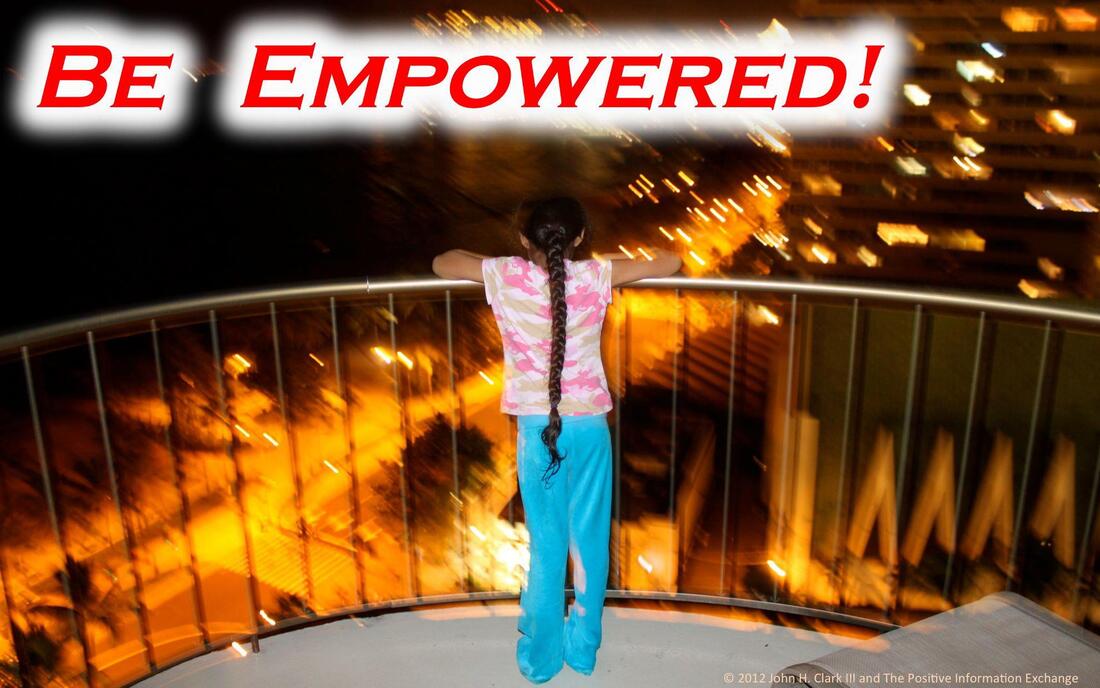
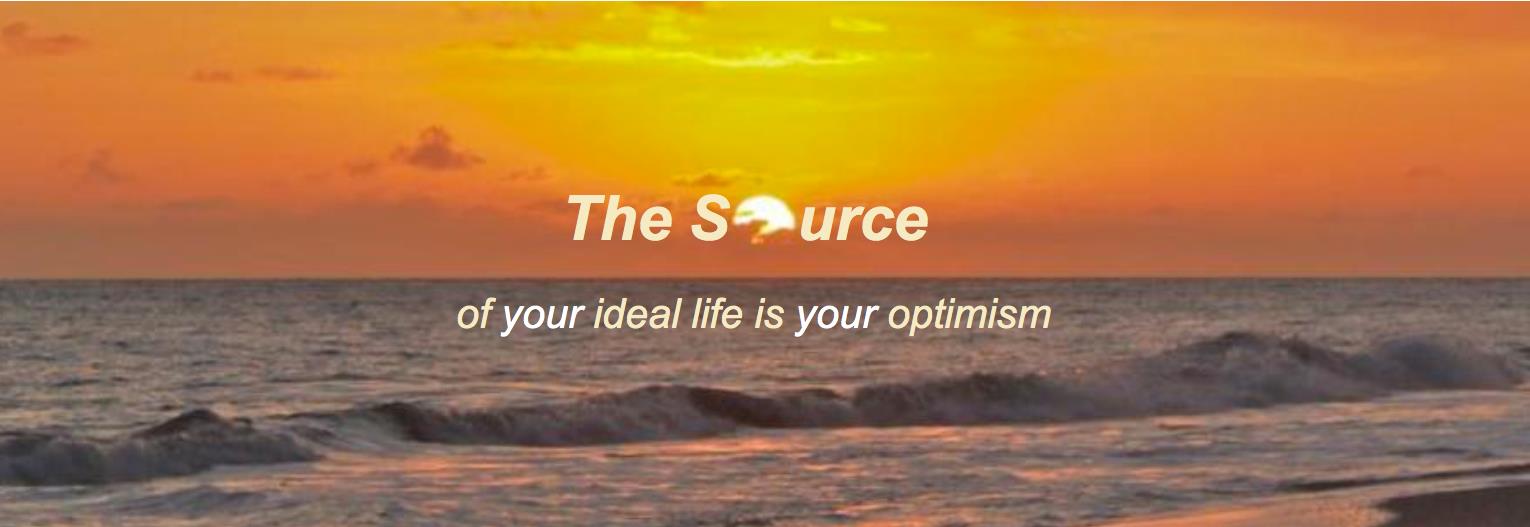


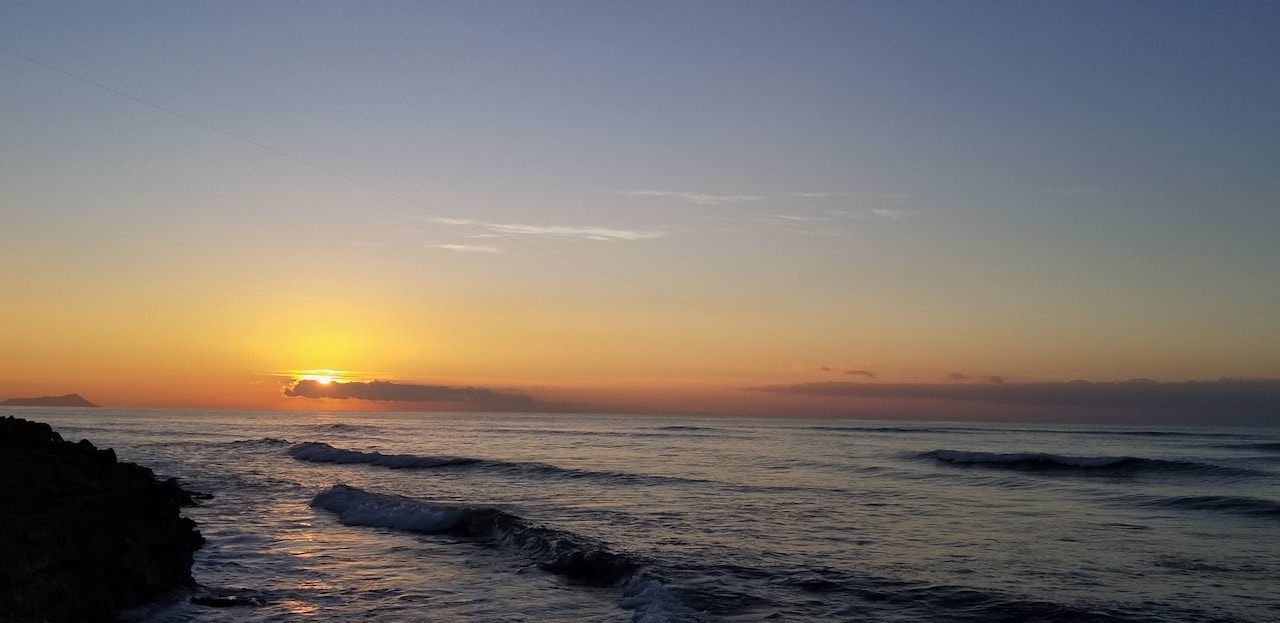
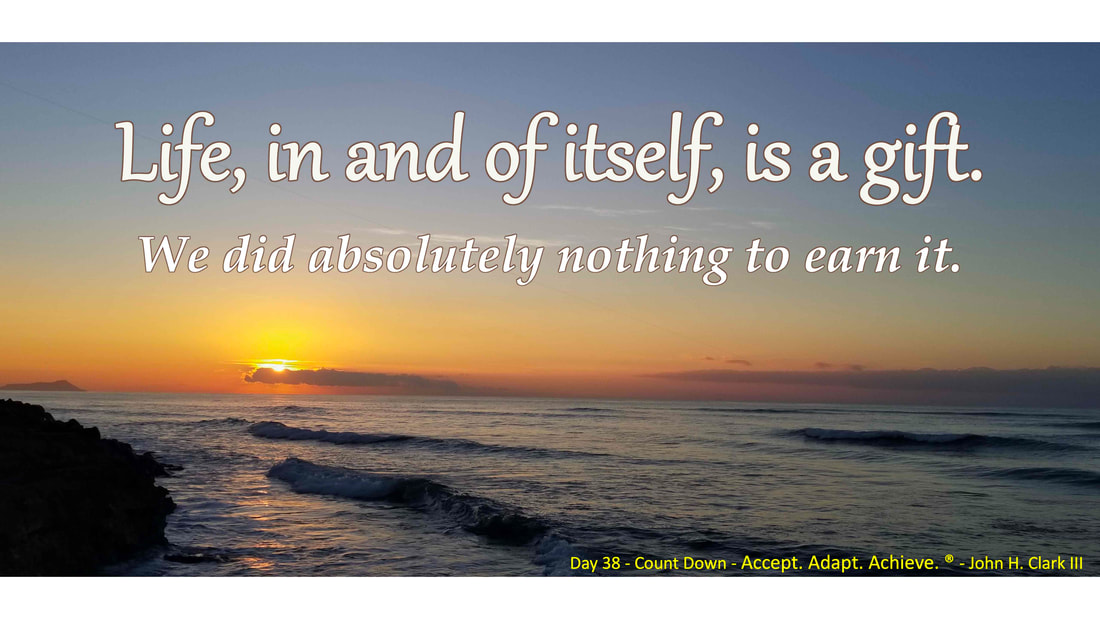
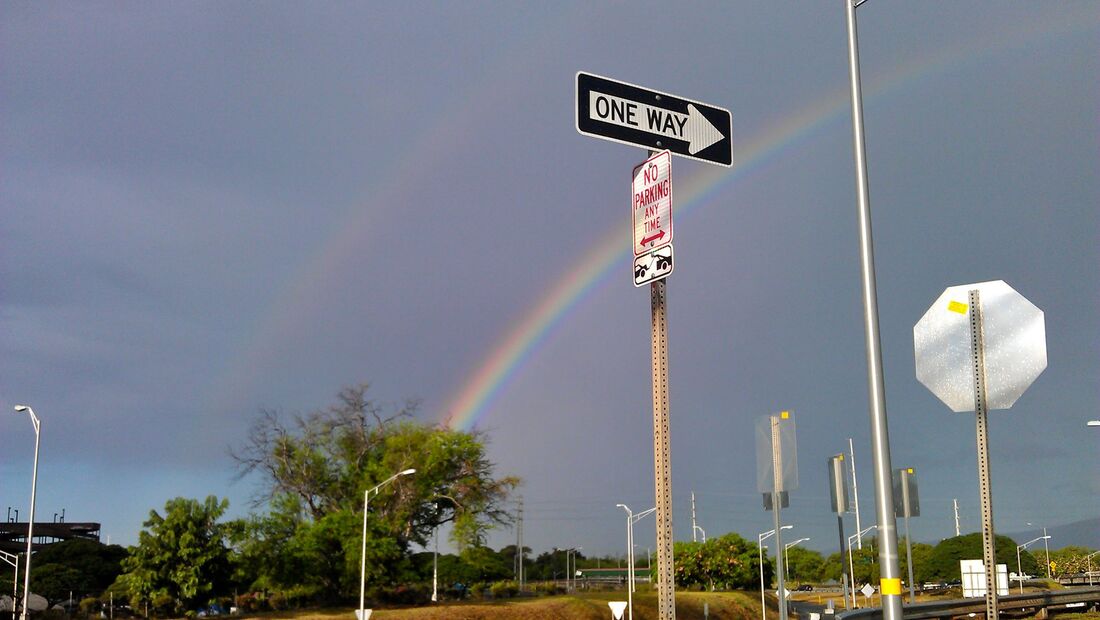
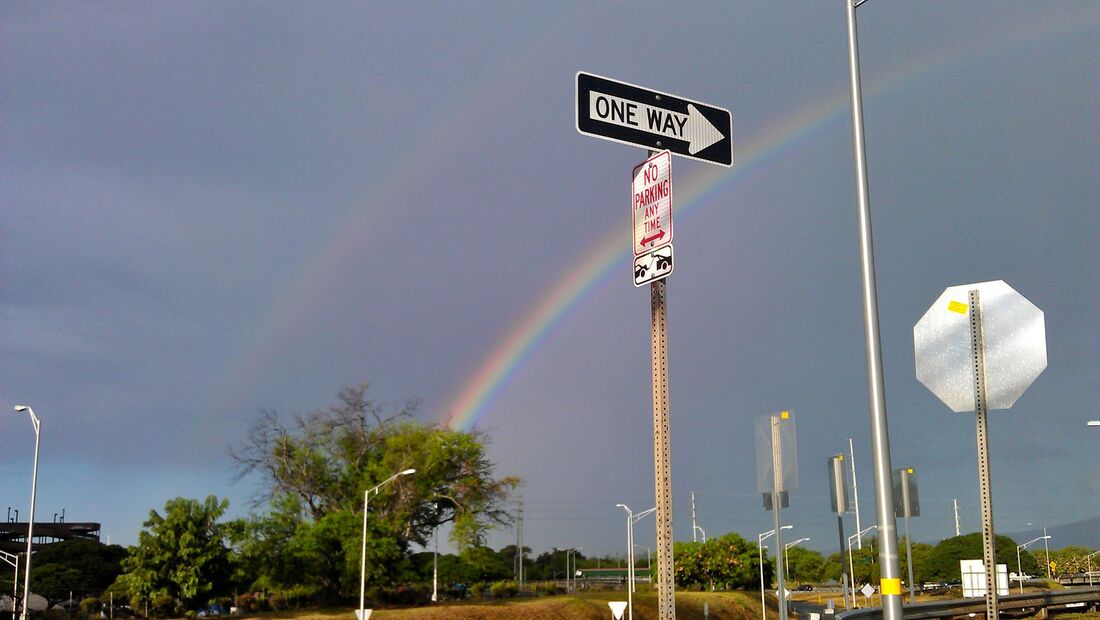
 RSS Feed
RSS Feed
